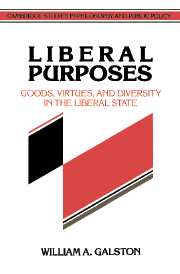Crossref Citations
This Book has been
cited by the following publications. This list is generated based on data provided by Crossref.
Hammersley, Martyn
1992.
Reflections on the Liberal University: truth, citizenship and the role of the academic.
International Studies in Sociology of Education,
Vol. 2,
Issue. 2,
p.
165.
McLaughlin, T. H.
1992.
Citizenship, Diversity and Education: a philosophical perspective.
Journal of Moral Education,
Vol. 21,
Issue. 3,
p.
235.
Klosko, George
1993.
Rawls's “Political” Philosophy and American Democracy.
American Political Science Review,
Vol. 87,
Issue. 2,
p.
348.
Lund, William R.
1993.
Communitarian Politics and the Problem of Equality.
Political Research Quarterly,
Vol. 46,
Issue. 3,
p.
577.
1993.
Virtue and the Common Good in Liberal Theory.
The Journal of Politics,
Vol. 55,
Issue. 4,
p.
1046.
Smith, Rogers M.
1993.
Equal Protection Remedies: The Errors of Liberal Ways and Means.
Journal of Political Philosophy,
Vol. 1,
Issue. 3,
p.
185.
Sinopoli, Richard C.
1993.
Liberalism and Contested Conceptions of the Good: The Limits of Neutrality.
The Journal of Politics,
Vol. 55,
Issue. 3,
p.
644.
Dyzenhaus, David
1994.
Pornography and Public Reason.
Canadian Journal of Law & Jurisprudence,
Vol. 7,
Issue. 2,
p.
261.
Kent, Bonnie
1994.
Moral Provincialism.
Religious Studies,
Vol. 30,
Issue. 3,
p.
269.
Andrews, J.S.
1994.
Liberal Equality and the Justification of Multicultural, Civic Education.
Canadian Journal of Law & Jurisprudence,
Vol. 7,
Issue. 1,
p.
111.
MOUFFE, CHANT AL
1994.
Political Liberalism. Neutrality and the Political.
Ratio Juris,
Vol. 7,
Issue. 3,
p.
314.
Neal, Patrick
1995.
Dworkin on the Foundations of Liberal Equality.
Legal Theory,
Vol. 1,
Issue. 2,
p.
205.
BADER, VEIT
1995.
Citizenship and Exclusion.
Political Theory,
Vol. 23,
Issue. 2,
p.
211.
Aronovitch, Hilliard
1995.
In Defence of Modernity.
Dialogue,
Vol. 34,
Issue. 2,
p.
321.
Spiecker, Ben
and
Steutel, Jan
1995.
Political Liberalism, Civic Education and the Dutch Government.
Journal of Moral Education,
Vol. 24,
Issue. 4,
p.
383.
Kersh, Rogan
1995.
Explaining old worlds.
Inquiry,
Vol. 38,
Issue. 1-2,
p.
83.
Uhr, John
1995.
Institutions in context: Reconstructing Aristotle's defence of cultural studies.
Australian Journal of Political Science,
Vol. 30,
Issue. 2,
p.
211.
Mara, Gerald M.
and
Dovi, Suzanne L.
1995.
Mill, Nietzsche, and the Identity of Postmodern Liberalism.
The Journal of Politics,
Vol. 57,
Issue. 1,
p.
1.
Keller, Andreas
and
Ullrich, Martina
1995.
Kommunitarismus und praktische Politik.
p.
126.
Ivison, Duncan
1995.
The Art of Political Liberalism.
Canadian Journal of Political Science,
Vol. 28,
Issue. 2,
p.
203.



